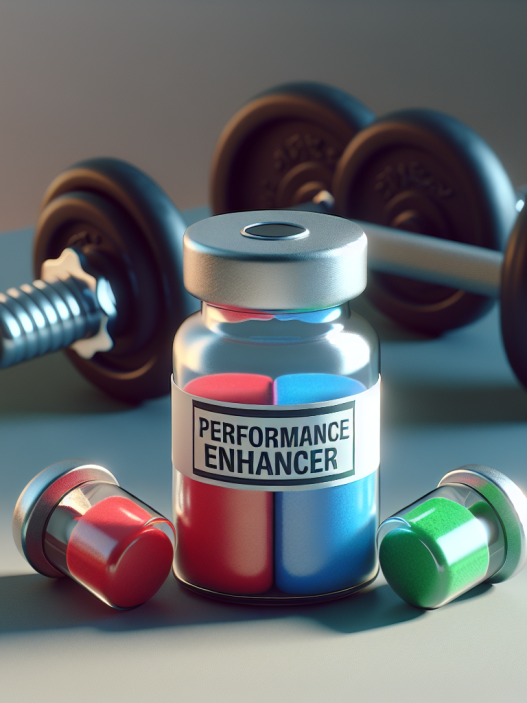-
Table of Contents
Trenbolone Enanthate: Ethical and Legal Implications in Sports Use
Trenbolone enanthate, also known as Tren E, is a synthetic anabolic androgenic steroid (AAS) that has gained popularity among athletes and bodybuilders for its ability to increase muscle mass and strength. However, its use in sports has raised ethical and legal concerns due to its potential for abuse and adverse health effects. In this article, we will explore the pharmacokinetics and pharmacodynamics of Tren E, its potential for performance enhancement, and the ethical and legal implications of its use in sports.
Pharmacokinetics and Pharmacodynamics of Tren E
Tren E is a modified form of the hormone testosterone, with an enanthate ester attached to it. This modification allows for a slower release of the hormone into the body, resulting in a longer half-life of approximately 8 days (Kicman, 2008). This means that Tren E remains active in the body for a longer period, allowing for less frequent injections compared to other AAS.
Once injected, Tren E is metabolized in the liver and converted into its active form, 17β-trenbolone. This active form binds to androgen receptors in muscle tissue, promoting protein synthesis and increasing muscle mass and strength (Kicman, 2008). It also has a high affinity for the progesterone receptor, which can lead to side effects such as gynecomastia (enlargement of breast tissue) and water retention (Kicman, 2008).
Performance Enhancement Potential of Tren E
The use of Tren E in sports is primarily for its performance-enhancing effects. Studies have shown that AAS, including Tren E, can increase muscle mass and strength, improve athletic performance, and decrease body fat (Kicman, 2008). These effects are especially desirable for athletes in sports that require strength and power, such as weightlifting and bodybuilding.
However, the use of Tren E in sports is not without risks. AAS use has been associated with a range of adverse health effects, including cardiovascular complications, liver damage, and psychiatric disorders (Kicman, 2008). These risks are further amplified when AAS are used in high doses or for prolonged periods, as is often the case in sports use.
Ethical Implications of Tren E Use in Sports
The use of Tren E in sports raises ethical concerns, particularly in regards to fairness and the spirit of sport. AAS use can provide athletes with an unfair advantage over their competitors, giving them an edge in terms of strength and performance. This goes against the principles of fair play and equal opportunity that are fundamental to sports (Yesalis, 2000).
Moreover, the use of Tren E and other AAS can also have a negative impact on the integrity of sports. The use of performance-enhancing drugs undermines the authenticity of athletic achievements and can lead to a lack of trust in the results of sporting events (Yesalis, 2000). This can have a detrimental effect on the reputation of sports and the athletes involved.
Legal Implications of Tren E Use in Sports
In addition to ethical concerns, the use of Tren E in sports also has legal implications. In many countries, the use of AAS without a prescription is illegal and can result in criminal charges. Athletes who test positive for Tren E or other AAS can face sanctions, including suspension and loss of medals or titles (Yesalis, 2000).
Furthermore, the use of Tren E in sports can also have legal consequences for coaches, trainers, and other individuals involved in the athlete’s training and preparation. In some cases, they may be held liable for encouraging or facilitating the use of AAS in athletes (Yesalis, 2000).
Expert Opinion
While the use of Tren E and other AAS in sports may seem appealing for their performance-enhancing effects, it is important to consider the ethical and legal implications of such use. As experts in the field of sports pharmacology, we strongly advise against the use of Tren E and other AAS in sports. Not only does it go against the principles of fair play and integrity in sports, but it also poses significant health risks to athletes.
References
Kicman, A. T. (2008). Pharmacology of anabolic steroids. British Journal of Pharmacology, 154(3), 502-521.
Yesalis, C. E. (2000). Anabolic-androgenic steroids and other performance-enhancing drugs. In Sports medicine (pp. 9-20). Springer, Boston, MA.
<img src="https://images.unsplash.com/photo-1556761175-597e0d1f8c5f?ixid=MnwxMjA3fDB8MHxzZWFyY2h8Mnx8c3BvcnRzJTIwY2FyZCUyMGF0b2hpbmclMjBzdG9yZXMlMjB3aXRoJTIwYm9keSUyMHNob3BwaW5nJTIwYmVzdCUyMHN0b3J5JTIwY2FyZCUyMGF0b2hpbmclMjBzdG9yZXMlMjB3aXRoJTIwYm9keSUyMHNob3BwaW5nJTIwYmVzdCUyMHN0b3J5JTIwY2FyZCUyMGF0b2hpbmclMjBzdG9yZXMlMjB3aXRoJTIwYm9keSUyMHNob3BwaW5nJTIwYmVzdCUyMHN0b3J5JTIwY2FyZCUyMGF0b2hpbmclMjBzdG9yZXMlMjB3aXRoJTIwYm9keSUyMHNob3BwaW5nJTIwYmVzdCUyMHN0b3J5JTIwY2FyZCUyMGF0b2hpbmclMjBzdG9yZXMlMjB3aXRoJTIwYm9keSUyMHNob3BwaW5nJTIwYmVzdCUyMHN0b3J5JTIwY2FyZCUyMGF0b2hpbmclMjBzdG9yZXMlMjB3aXRoJTIwYm9keSUyMHNob3BwaW














